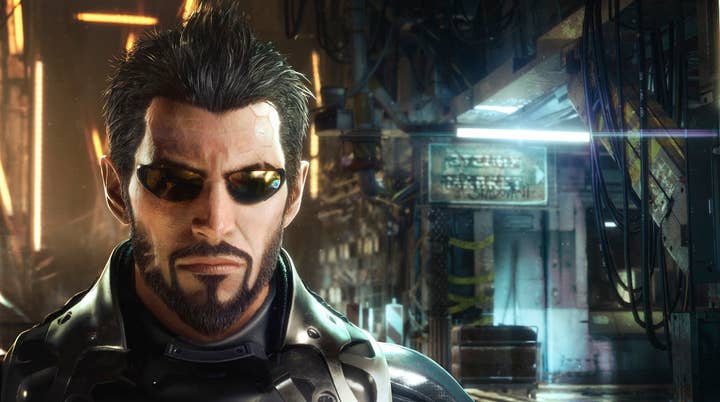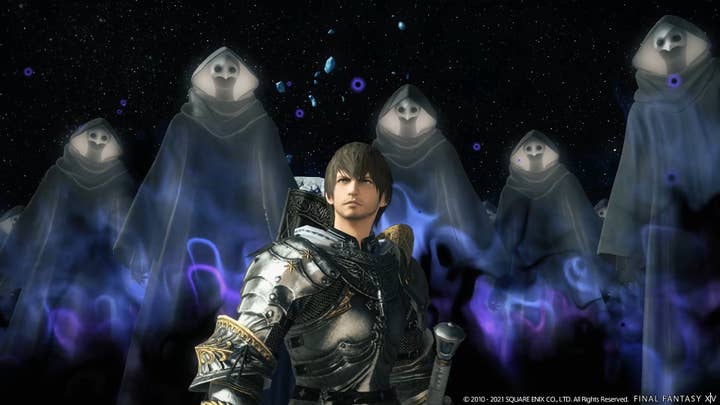Square Enix sale of Western studios marks the end of an existential crisis | Opinion
Embracer Group acquisition signals an end to Japanese publishers looking to foreign studios in fear of fading relevance
Yesterday's news that Square Enix is selling off Crystal Dynamics, Eidos Montreal and Square Enix Montreal marks the apparent end of a chapter in not just the publisher's history, but that of the entire Japanese game industry.
About 15 years ago, there was a bit of a malaise in the Japanese industry. The buzziest genres in the industry had been open-world action games like Grand Theft Auto and Assassin's Creed, and first-person shooters like the Call of Duty and Halo franchises. Rhythm games were also dominant, although most noticeably in the form of the Guitar Hero and Rock Band franchises started by Boston-based Harmonix rather than the Japanese-developed rhythm games to which Harmonix owed a significant debt of inspiration.
Even as the industry was booming (at least until the global financial crisis really settled in), Japanese third-party publishers across the board were increasingly concerned that consumers around the world were just not interested in the types of games they were good at making.
It was the conventional wisdom of the day, a sentiment so benign and accepted that it was freely voiced by Konami's Hideo Kojima, Capcom's R&D head Keiji Inafune, Tango Gameworks' Shinji Mikami, and Square Enix' then-president Yoichi Wada.
Square Enix went bigger on the Western strategy than any of its peers
The answer for many Japanese publishers of the day was to start making games for the tastes of overseas customers, in many cases hiring overseas developers to make them.
Capcom was among the first to articulate its push to increase its appeal to Western audience, first finding success in 2006 with Japanese-developed games created with Western tastes in mind like Dead Rising and Lost Planet. After promising starts for that pair, Capcom began turning to Western studios to make the games, a strategy that produced a series of disappointments like Dark Void, Bionic Commando, and Lost Planet 3. Ninja Theory's DmC: Devil May Cry reviewed well, but also alienated a chunk of the fanbase with its departures from the series roots.
Konami was less vocal about its Western strategy than Capcom, but still partnered with foreign studios for failed new IP like NeverDead and the trend-chasing Rock Revolution (an ignoble result for the rhythm game considering Konami's own Guitar Freaks had laid out the template for Guitar Hero's success years earlier).
Konami was also less shy about entrusting some of its biggest brands to Western studios. Silent Hill Origins, Homecoming, Shattered Memories, Downpour, and Book of Memories were all developed by Western studios, and collectively help explain why the franchise has been dormant for a decade. Spanish-studio Mercury Steam developed the well-received Lords of Shadow and its considerably less well-received sequel, while WayForward developed 2007's acclaimed DS title Contra 4.
Sega was an early mover on the Western front, acquiring UK-based Total War developer Creative Assembly and Football Manager creator Sports Interactive in 2005. It signed exclusive rights to make games for the first four franchises in the Marvel Cinematic Universe and entrusted them to (mostly external) North American studios, and planned an entire slate of Aliens games from studios like Obsidian, Rebellion, and Gearbox. It also acquired San Francisco-based Secret Level in 2006 and put it to work on projects like the first Iron Man game and Golden Axe: Beast Rider, a reboot of a hit Genesis-era franchise.
Namco Bandai followed its fellow Japanese publishers' leads, prepping a slate to appeal to Western audiences including a Clash of the Titans movie tie-in, Ninja Theory's Enslaved: Odyssey to the West, and the first-person shooter Inversion. It even entrusted a few of its own big franchises to Western studios with Splatterhouse ( the less said about that the better) and Ridge Racer: Unbounded.

And then there was Square Enix, which went bigger on the Western strategy than any of its peers. It acquired Eidos in 2009, and turned out a string of well-received games in Western-friendly genres, revitalizing the Tomb Raider, Deus Ex, and Hitman franchises in a big way. Partnerships with external Western developers also led to well-received and influential titles like Sleeping Dogs and the Just Cause sequels, Life is Strange, the Square Enix Montreal-developed mobile games like Hitman Go and Lara Croft Go, Outriders, and more.
They weren't all hits -- Kane & Lynch 2 and the Thief reboot spring to mind -- but the high points were promising enough to keep Square Enix pursuing its Western strategy after most its fellow Japanese publishers had pivoted to something else.
Japanese publishers started making games for the tastes of overseas customers, in many cases hiring overseas developers to make them
Square Enix has been as successful with its Western expansion as any of the major Japanese publishers that pursued the strategy, but to hear the publisher tell it, the effort has been defined by disappointment after disappointment.
When the Tomb Raider reboot launched to glowing reviews and 3.4 million launch-month sales, it still fell short of the company's expectations, as did Hitman Absolution with 3.6 million sales in four months.
IO Interactive's 2016 reboot of the Hitman franchise was also critically acclaimed, but again fell short of expectations, which Square Enix president Yosuke Matsuda gave as his reason for letting the studio management buy back its independence from the publisher the following year.
Marvel's Avengers is the obvious one, a tie-in game for one of the hottest brands in entertainment that was hyped for years, only to post mixed reviews and disappointing sales off an estimated $190 million budget.
Last year's Guardians of the Galaxy game fared much better with critics and players, but like so many of the publisher's prior efforts to appeal to Western audiences, failed to reach its sales targets.
The succession of disappointments even when the games themselves were great appeared to wear on the publisher's patience. The fact that Square Enix was apparently fine having its marquee Western studio lend a hand on a Perfect Dark reboot instead of work on anything Square Enix controlled certainly looks like an indicator of waning interest.
At the same time, Square Enix has seen a string of successes from its Japanese development studios. Nier: Automata, a slew of Final Fantasies (most notably 14, 15, and 7 Remake), and a steady drumbeat of smallball RPG remakes, re-releases and targeted efforts like Triangle Strategy or I am Setsuna help to put to rest any notion that Western audiences have entirely lost their taste for what Japanese developers are offering.
Square Enix's fellow Japanese publishers have figured it out as well. Namco Bandai has scored hits for years with From Software's Souls series, and this year's Elden Ring in particular has shown that Japanese creative sensibilities are perfectly compatible with a breakthrough global blockbuster.

Capcom's most successful Western partnership was probably with Dead Rising 2 developer Blue Castle Games, which it quickly acquired and renamed Capcom Vancouver. That was about the high point for that partnership however, as the studio continued to turn out Dead Rising titles to gradually diminishing returns, and Capcom shut it down in 2018.
But that same year, Capcom's Monster Hunter World took the prototypical "Big in Japan Only" franchise and turned it into the single best-selling game in company history, selling 168% of the next biggest title's total. (That second-biggest game was 2017's Resident Evil 7, a celebrated return-to-form for the survival horror after the sixth installment drew criticisms for trying too hard to ape popular Western games like Call of Duty and Michael Bay movies.)
Nier: Automata, a slew of Final Fantasies, and targeted efforts like Triangle Strategy help to put to rest any notion that Western audiences lost their taste for what Japanese devs offer
Just as Sega was early to accelerate its courtship of Western audiences, so too was it early to hit the brakes on it. Sega pulled the plug on its San Francisco studio in 2010 and drastically restructured its entire Western business in 2012. But between The Creative Assembly, Sports Interactive, and more recent pick-ups like Two Point, Sega has very much maintained a Western presence, and an often successful one at that.
At the same time, the Sega brand itself has leaned into some of its most distinctly Japanese content to considerable success abroad. The 2013 acquisition of Atlus continues to pay off as the Persona and Shin Megami Tensei series roll along, while the Yakuza franchise has only grown in popularity in the West, even as its most recent installment switched its core gameplay from a beat-'em-up to more traditional JRPG menu-driven fights.
Konami breaks the pattern a bit thanks to its virtual abandonment of key franchises and being at the point where it has to announce its gaming division's continued existence, but I will point out it is having its largest current successes in the console and PC space by re-releasing its Japanese-developed games of yesteryear for audiences around the world.
With Square Enix offloading a chunk of its operations to Embracer Group, it seems the existential crisis Japanese publishers had about whether there was an international audience for Japanese-developed games has well and truly passed.
Realistically, it's been fading for a while now. When we spoke with Matsuda in 2017, he was already referring to it as "a generational shift" from which the company "learned an expensive lesson."
"In the case of Final Fantasy XV, I told the developers they should do what they thought was best, that there was no need for them to be overly conscious about what the Western developers do," Matsuda said. "They should do what they wanted to do and that would prove the most attractive. And probably the same kind of thing was going on at other Japanese publishers as well. People started working on leveraging their own strengths.
"This isn't something that just applies to Japanese developers but also to the Western developers. I believe they're able to create the best games when they develop titles leveraging their own individuality."
